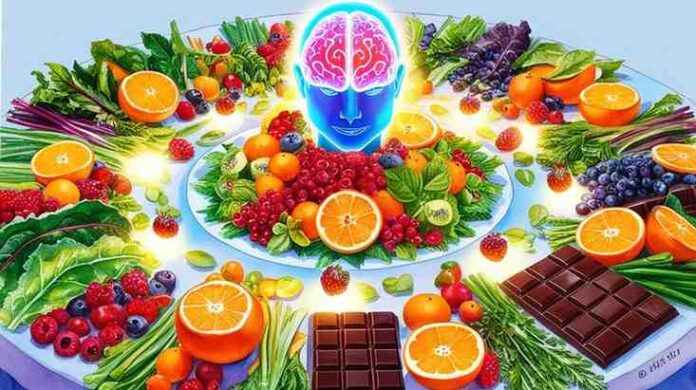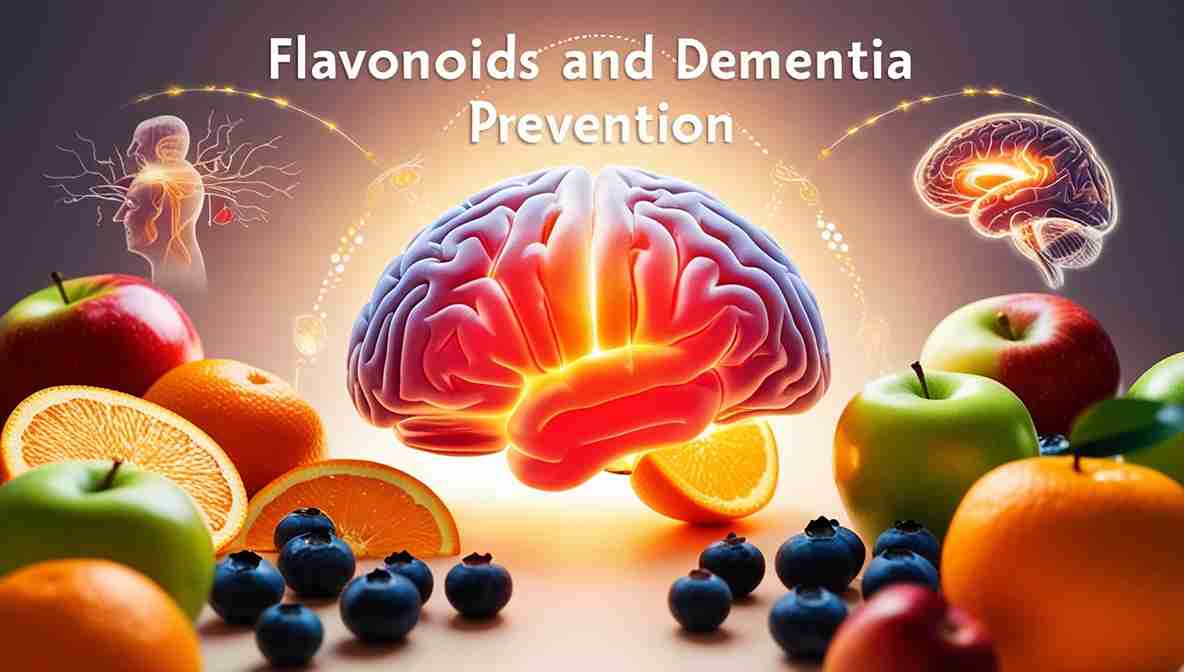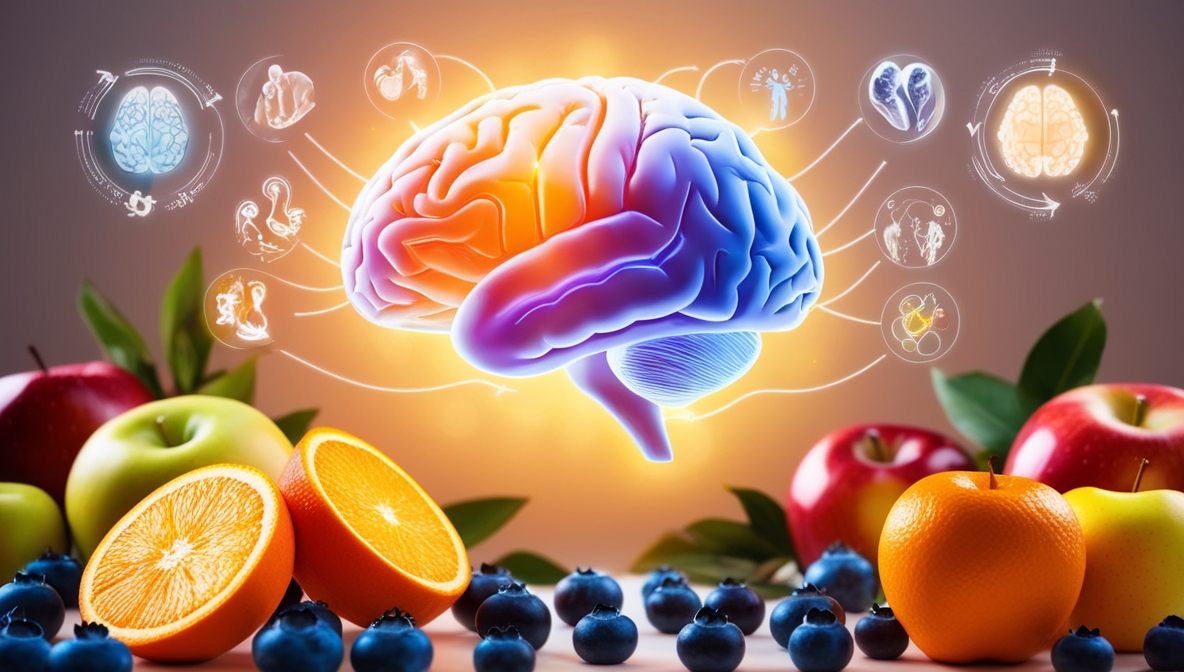Emerging research suggests that incorporating flavonoid-rich foods into your daily diet could significantly reduce the risk of developing dementia, potentially by as much as 50%. Flavonoids, found naturally in fruits, vegetables, and certain beverages, possess potent antioxidant and anti-inflammatory properties that play a crucial role in protecting brain health.
Importance: A diet rich in flavonoid-containing foods (referred to as a flavodiet) may offer an effective public health strategy to lower the risk of dementia by emphasizing a variety of foods with brain health benefits.
Objective: To explore the relationship between adherence to a flavodiet and the intake of specific flavonoid subclasses and how these are linked to dementia risk, particularly in individuals with genetic predispositions, depression, or hypertension.
Increase slowly. Daily Consumption of Flavonoid-Rich Foods May Decreases Dementia Risk
A recent large-scale study involving UK adults suggests that increasing the intake of flavonoid-rich foods like tea, red wine, and berries could significantly reduce the risk of developing dementia. The research highlights that individuals with certain risk factors—such as a high genetic predisposition to dementia, hypertension, or symptoms of depression—may particularly benefit from these dietary habits. Flavonoids, found naturally in many plant-based foods, are known for their antioxidant properties, which are believed to support brain health and lower the chances of cognitive decline.
Here are the important points related to “Daily Flavonoid-rich Food Intake May Lower Dementia Risk by 50%”:
- High flavonoid intake linked to reduced dementia risk over a mean follow-up of 10 years, with 1000 reported cases of dementia.
- People with higher flavonoid consumption were generally more physically active, had a lower BMI, and experienced less financial hardship than those with lower consumption.
- Participants with the highest flavonoid intake (6 additional daily servings of flavonoid-rich foods) were 20 to 30% less likely to develop dementia compared to those with the lowest intake.
- Risk reduction was more significant in individuals with specific conditions:
- 45% less risk for those with high genetic risk
- 32% less risk for individuals with hypertension
- 47% less risk for individuals with depressive symptoms
- Consuming two daily servings of tea, red wine, or berries offered the greatest protection, reducing dementia risk by 39% compared to those who consumed less.
- Tea, red wine, and berries were key contributors to the protective effect, as removing them from the diet diminished the benefits.
- Higher intakes of specific flavonoid subclasses (anthocyanins, flavan-3-ols, flavonols, flavones) were also linked to a lower dementia risk.
- Study limitations included:
- Self-reported dietary data, which can introduce bias.
- Participants being from a healthier population, limiting generalizability.
- The possibility of reverse causation, where participants changed their diets before showing symptoms of dementia.
What are Flavonoids?
Flavonoids are plant compounds that offer numerous health benefits. They are present in a variety of foods like berries, citrus fruits, leafy greens, tea, and dark chocolate. These compounds have been shown to enhance brain function and improve blood circulation. And reduce oxidative stress, all of which contribute to a lower risk of cognitive decline.
Flavonoids are compounds found in a variety of fruits, vegetables, and beverages. They are particularly abundant in foods such as tea, red wine, dark chocolate, and various berries.
The Study’s Findings
The UK-based cohort study tracked a large group of adults over several years, analyzing their dietary patterns and health outcomes. The results showed that individuals who consumed higher amounts of flavonoid-rich foods had a lower likelihood of developing dementia, especially those who already faced increased risks due to genetics or other health conditions like high blood pressure and depression.
How Flavonoids Affect Brain Health
Flavonoids are believed to improve cognitive function by reducing oxidative stress in the brain. Promoting better blood flow and reducing inflammation. This combination of effects supports the overall health of neurons and protects against the deterioration that leads to dementia and other cognitive impairments.
The Link Between Flavonoids and Dementia Prevention
A growing body of research indicates that regular consumption of flavonoids can protect the brain from the harmful effects of aging and disease. Oxidative stress and inflammation are two key factors in the development of neurodegenerative conditions like dementia. Flavonoids help neutralize free radicals, reduce inflammation, and support the brain’s natural defenses.
Studies have shown that individuals who consume a diet rich in flavonoids are less likely to develop dementia. For example, a study published in the American Journal of Clinical Nutrition found that individuals with higher flavonoid intake had a 50% reduced risk of developing Alzheimer’s disease compared to those with lower intake.
Flavonoid-Rich Foods to Include in Your Diet
Incorporating more flavonoid-rich foods into your daily meals is simple and can offer significant long-term benefits for brain health. Here are some examples of foods high in flavonoids:
- Flavonoids are potent antioxidants found in plant-based foods, offering various health benefits.
- Higher consumption of flavonoid-rich foods is linked to a notable decrease in dementia risk, especially for individuals at higher risk
- Green tea and black tea: Green and black teas are particularly high in flavonoids.
- Berries are all excellent sources.
- Red Wine: In moderation, red wine provides beneficial flavonoids.
- Dark Chocolate: Rich in flavonoids, but should be consumed in moderation.
- Citrus Fruits: Oranges, lemons, and grapefruit are packed with flavonoids
- Apples and pears
- Leafy greens (spinach, kale)
How Flavonoids Protect the Brain
Flavonoids work on a cellular level to protect neurons, improve blood flow to the brain, and reduce inflammation. They also promote the production of neuroprotective proteins, which help the brain repair and protect itself against damage.
The anti-inflammatory effects of flavonoids help combat chronic inflammation, a condition linked to the development of various neurodegenerative diseases, including dementia.
Incorporating Flavonoids into Your Daily Routine
To reap the benefits of flavonoids, aim to include a variety of flavonoid-rich foods in your daily diet. Swap out processed snacks for fresh fruits, add leafy greens to your meals, and enjoy a cup of tea or a piece of dark chocolate as part of your daily routine.
Conclusion
Alzheimer’s affects millions of people worldwide. But the evidence is growing that a flavonoid-rich diet may help lower the risk of developing this condition by up to 50%. By making simple changes to your diet and incorporating more fruits, vegetables, and other phenol-packed foods. you can support brain health and reduce the risk of cognitive decline
FAQs
What are flavonoids?
Flavonoids are natural compounds found in many plant-based foods. Known for their antioxidant and anti-inflammatory properties.
Which foods are rich in flavonoids?
Tea, berries, red wine, citrus fruits, and dark chocolate are some of the best sources of flavonoids.
How do flavonoids help with brain health?
Flavonoids reduce oxidative stress and inflammation in the brain, improving cognitive function and potentially lowering the risk of dementia.
Can flavonoids cure dementia?
While they cannot cure dementia, flavonoids can help reduce the risk of developing it by supporting brain health.







